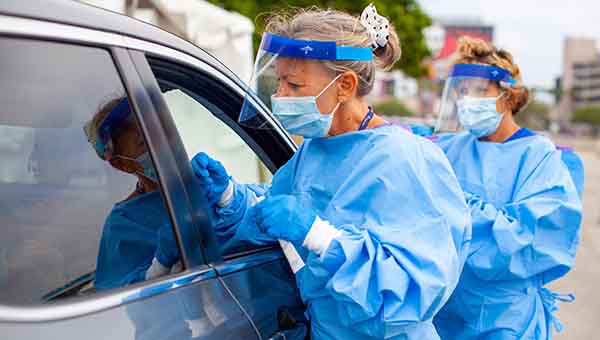Do I Need to Quarantine?

The dreaded call comes. Someone you’ve been in contact with in recent days -- or someone your coworker, friend, spouse, child, has been in contact with in recent days -- has received a positive COVID-19 diagnosis. Do you need to quarantine to protect your friends and family?
The answer lies in understanding the most recent guidance from the Centers for Disease Control and applying it to the situation in which you were in proximity to a COVID-19-positive person – and then acting on it when necessary. Those actions include isolation and quarantining and considering getting a test.
“The more each of us can do to help limit the spread of this virus, the better off our community and vulnerable populations will be,” said BayCare Chief Medical Officer Dr. Nishant Anand. “Please wear a mask, wash your hands and social distance – but please also quarantine and isolate if you are exposed to an infected person.”
So how do you know if you were exposed? Start with a few questions:
- Determine if your contact with the person was during the time they were considered infectious:
- A person is considered infectious up to two days before they display symptoms or had a positive specimen collected for a test.
- If you were exposed to someone on a Sunday and they don’t have start having symptoms until the following Saturday, you are not likely to have been exposed.
- But if you were to learn the person you were near on Sunday took a test on Tuesday that turned out positive, you need to ask yourself a few more questions.
- Did your exposure to a COVID-19-positive person meet the definition of “close contact?” Close contact is determined by a combination of both proximity and/or duration of exposure over a 24-hour period to a person that has COVID-19. If you answer yes to any of the following three scenarios, you should consider getting tested and you should isolate and quarantine for 14 days to avoid spreading the virus to others – even if your initial test comes back negative:
- You were within 6-feet of the person who tested positive for COVID-19 for more than 15 minutes in one day and both of you did NOT have your face covered. That 15 minutes could have been in one instance or over the course of a 24-hour period. (If one or both of you were masked, you should self-monitor for symptoms, fever and/or cough, and if symptoms develop, isolate and quarantine and consider getting tested).
- You had any physical contact with the person or with items they touched, such as a shared utensil at a meal. Or if they were displaying any respiratory symptoms, such as coughing or sneezing, that could have spread respiratory secretions.
- You have shared a household for at least one night with the infected person.
- What if I don’t meet any of the definitions in #2 but my spouse or child or co-worker does. Do I need to quarantine?
- The important thing is for the person in close contact to an infected person to get tested and quarantine and isolate away from others for 14 days – even if an initial test comes back negative. Others in the household should self-monitor for symptoms but if they ever meet the qualifications laid out in #2 for close contact with a COVID-19-positive person, they should consider getting tested and quarantine and isolate as well for 14 days.
- If I get a negative test, do I still need to quarantine?
- Yes, if you meet any of the definitions found in #2. Testing has come a long way in the months since the novel coronavirus hit the United States, but it is still new technology. It is not uncommon for people to initially test negative for the virus because they tested too early in the infection cycle. General guidance is to test for COVID-19 about 3 to 5 days after exposure and then again 12 to 14 days after exposure.


